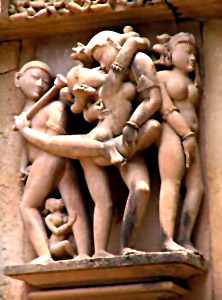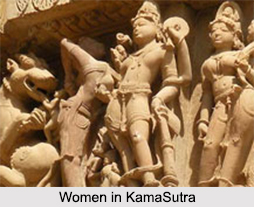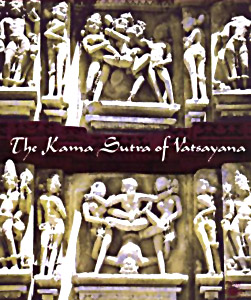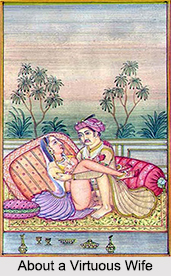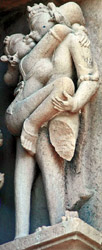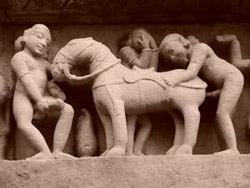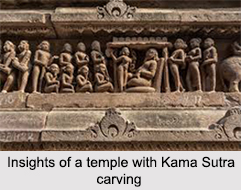It sometimes happens that while gains are required one incurred only losses, which is very unfortunate. The causes of these losses are:
•Weakness of intellect
•Excessive love
•Excessive pride
•Excessive self conceit
•Excessive simplicity
•Excessive confidence
•Excessive anger
•Carelessness
•Recklessness
•Influence of evil genius
•Accidental circumstances
The results of these losses are:
•Expense incurred without any result
•Destruction of future good fortune
•Stoppage of gains about to be realized
•Loss of what is already obtained
•Acquisition of a sour temper
•Becoming rude to every body
•Injury to health
•Loss of hair and other accidents
Kamasutra has differentiated gains in three types:
•Gain of wealth,
•Gain of religious merit, and
•Gain of pleasure.
Similarly loss according to Kamasutra is of three kinds:
•Loss of wealth,
•Loss of religious merit, and
•Loss of pleasure.
Kamasutra opines that when someone is looking for a gain and some other gains come along with them, these are called attended gains. If the gain is uncertain and there is some doubt about it, it is called a simple doubt. When there is a doubt whether either of two things will happen or not, it is called a mixed doubt. In case of doing a thing two results take place, it is called a combination of two results, and if several results follow from the same action, it is called a combination of results on every side.
As already discussed gain and loss both are of three types. Kamasutra cites examples to illustrate different types of situation to edify the reader about gains and losses.
When a courtesan lives with a great man she acquires wealth as well as she gets acquainted with other people and thus secure her future by accession of wealth and by becoming desirable to all. This situation is called a gain of wealth attended by other gain.
When a courtesan lives with a man and gets only money nothing else, then this is called a gain of wealth not attended by any other gain.
If any situation arises where the courtesans get money other than her lover, this can be resulted in to a chance of a bad fortune, chance of a dissatisfaction of a man securely attached to her, the abhorrence of all, and the chance of a union with some low profile persons. This gain is called a gain of wealth attended by losses.
If a courtesan lives with a man at her own cost without thinking about gain like with a great man or a rapacious minister, for the sake of deviating some misfortune. Thus, this case of removing some cause that may be threatening the destruction of great gain is called a loss of wealth attended by gains.
When a courtesan at her own expense, lives with a man who is very miser, or proud of his looks, or to an ungrateful man skilled in gaining the hearts of others, and thus without any gain incurred only loss, this is called a loss of wealth not attended by any gain.
When a courtesan is living with any person of the above two cases, who are basically a favourite person of the king, and also cruel and powerful, she without any gain always have a chance to turned away at any moment, this loss is called a loss of wealth attended by other losses.
Thus in Kamasutra the remarks on gains and losses, and attendant gains and losses end here.
In the next place we come to doubts, which are again of three kinds:
•Doubts about wealth,
•Doubts about religious merit, and
•Doubts about pleasures.
The following are examples:
When a courtesan is not sure about the wealth and treasure of the man she is living with, is called the doubt about wealth. She is also not sure about the amount of wealth the man is going to give her.
When a courtesan feels doubtful whether she is right in entirely deserting a lover from whom she is unable to get money, she takes all his wealth from him, this doubt is called a doubt about religious merit.
When a courtesan is unable to get hold of a lover to her liking, and is uncertain whether she will get any pleasure from a person surrounded by his family, or from a low person, this is called a doubt about pleasure.
When a courtesan is uncertain whether some powerful but low principled fellow would cause loss to her on account of her not being civil to him this is called a doubt about the loss of wealth.
When a courtesan feels doubtful whether she would lose religious merit by leaving a man who is emotionally involved with her, and by doing so the man will feel unhappy and his life will become miserable. This doubt is called a doubt about the loss of a religious merit.
When a courtesan is uncertain as to whether she might create disaffection by speaking out, and revealing her love and thus not get her desire satisfied, this is called a doubt about the loss of pleasure.
Thus the remark son doubts end here.
Mixed Doubts:
Apart from the varied kind of doubts mentioned above Kamasutra also mentions situation of mixed doubts. The sexual relation with a stranger whose character is unknown and who has been introduced by a lover of hers may be prolific either of gain or loss, and therefore this is called a mixed doubt about the gain or loss of wealth.
When a courtesan is requested by a friend, or is encouraged by compassion to have intimate relationship with a learned Brahman, a religious student, a sacrificer, a devotee, or an ascetic who may be consequently at the point of death, by doing this she might either gain or lose religious merit, and therefore this is called a mixed doubt about the gain and loss of religious merit.
If a courtesan relies solely upon others about a man, and goes to him without finding out whether he possesses good qualities or not, she may either gain or lose pleasure, and therefore this is called a mixed doubt about the gain and loss of pleasure.
According to Uddalika there are gains and losses on both sides, which are as follows:
If, when living with a lover, a courtesan gets both wealth and pleasure from him, it is called a gain on both sides.
When a courtesan lives with a lover at her own expense without getting any profit out of it, and the lover even takes back from her what he may have formerly given her, it is called a loss on both sides.
When a courtesan is uncertain whether a new acquaintance would become attached to her, and, moreover, if he became attached to her, whether he would give her anything, it is then called a doubt on both sides about gains.
When a courtesan is uncertain whether a former enemy, would do her some injury on account of his grudge against her; or, if becoming attached to her, would take away angrily from her anything that he may have given to her, this is called a doubt on both sides about loss.
Again according to Babhravya the gains and losses on both sides are as follows:
When a courtesan can get money from a man whom she may or may not go to meet, this is called a gain on both sides.
When a courtesan has to incur further expense if she goes to meet a man, and yet runs the risk of incurring a severe loss if she does not go to see him, this is called a loss on both sides.
When a courtesan is uncertain whether a particular man would give her anything on her meeting, without incurring expense on her part or whether on her neglecting him another man would give her something, this is called a doubt on both sides about gain.
When a courtesan is uncertain whether, on going at her own expense to see an old enemy, he would take back from her what he may have given her, or whether by her not going to see him he would cause some disaster to fall upon her, this is called a doubt on both sides about loss.
By combining the above, the following six kinds of mixed results are produced:
•Gain on one side, and loss on the other
•Gain on one side, and doubt of gain on the other
•Gain on one side, and doubt of loss on the other
•Loss on one side, and doubt of gain on the other
•Doubt of gain on one side, and doubt of loss on the other
•Doubt of loss on one side, and loss on the other
According to Kamasutra, a courtesan while considering the above things, with the help of her friend`s advice should try to acquire great gain and avoid any disaster. Religious merit and pleasure should also be formed into separate combinations like those of wealth, and then all should be combined with each other, so as to form new combinations.
When a courtesan consorts with men she should cause each of them to give her money as well as pleasure. At particular times, such as the Spring Festivals, etc., she should tell her mother to announce, that on a certain day her daughter would remain with the man who would satisfy her requirements.
When young men approach her with delight, she should think what she could achieve through them.
The combination of gains and losses on all sides are gain on one side, and loss on all others; loss on one side and gain on all others; gain on all sides, loss on all sides.
A courtesan should also consider doubts about gain and loss with reference to both to wealth, religious merit, and pleasure.
Thus chapter on the consideration of gain, loss, attendant gains, attendant losses, and doubts ends here.
Kamasutra also classifies different kinds of courtesans:
•A bawd
•A female attendant
•An unchaste woman
•A dancing girl
•A female artisan
•A woman who has left her family
•A woman living on her beauty
•And, finally, a regular courtesan
Vatsayana affirms in his Kamasutra that all the above kinds of courtesans are acquainted with various kinds of men, and should consider the ways of getting money from them or pleasing them, and of reuniting with them. They should also take into consideration particular gains and losses, attendant gains and losses, and doubts in accordance with their several conditions.
Thus end the considerations of courtesans.
Kamasutra further supports the subject with two verses
`Men want pleasure, while women want money, and therefore this part, which treats of the means of gaining wealth, should be studied.`
`There are some women who seek for love, and there are others who seek for money; for the former the ways of love are told in previous portions of this work, while the ways of getting money, as practised by courtesans, are described in this part.`
